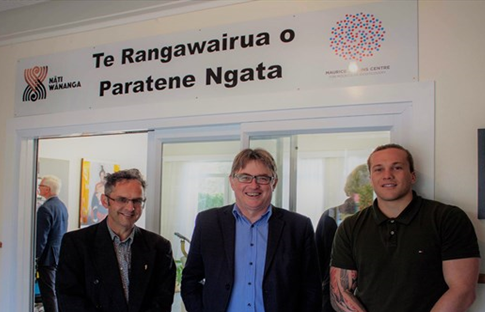Highlights

MWC network plays key role in national response to COVID-19 pandemic
Investigators from across the Centre have been instrumental in developing the tools necessary to track and trace the virus, i...
read the full story

Pilin protein may combat the hairy problem of human pathogens
MWC investigations into the puzzle of a nanoscopic skyscraper – ‘the pilus’ – have sparked separate lines of research into no...
read the full story

Dual approach drives precision medicine
Two pioneering studies by MWC investigators are looking at the resilience and risk factors for type 2 diabetes in Māori and P...
read the full story

Chasing a cancer suspect to cytokinesis
A potential new way to target aggressive cancers has been identified through a MWC project as part of the research programme ...
read the full story

Nationwide research flagship takes fight to global viral threats
A growing network of Maurice Wilkins Centre investigators around New Zealand are collaborating on research to tackle importa...
read the full story

Young MWC scientists gain valuable specialist research training
Over 2019 a record number of emerging researchers took up the opportunity to access valuable specialist research training and...
read the full story

MWC continues to lead the way in NZ cancer vaccine research
Immune therapy is one of the most exciting and promising areas of cancer research. Around New Zealand, teams of Maurice Wilki...
read the full story

Developing a vaccine to prevent rheumatic fever
Group A Streptococcus (GAS) infection is widespread around the world, but causes particularly serious complications in New Ze...
read the full story

Celebrations as regional research centres open
The MWC continued to strengthen its relationships with Māori communities in 2018. MWC Deputy Director Professor Peter Shepher...
read the full story

Building blocks for new medicines
The MWC uses New Zealand’s outstanding medicinal chemistry expertise to discover new medicines. A particular kind of chemistr...
read the full story

Turning the tables on cancer
Tumours often contain areas with less oxygen than is found in normal tissues. These areas are less vulnerable to many forms o...
read the full story

Growing miniature human organs from stem cells
Stem cells are cells that can grow into different types of cells in the body. They sit in special zones throughout the body ...
read the full story

Mid-term review sets future direction
A comprehensive independent assessment found the Centre to be performing at a high level, producing distinct and positive ben...
read the full story

Smarter drug design
An advanced experimental technique linked to high powered computation is becoming an increasingly important tool for MWC rese...
read the full story

High-impact publications highlight TB research
Researchers in the MWC’s Tuberculosis Flagship Research Programme have had their long hours in the lab recognised through pub...
read the full story

Working with Māori in regional research centres
MWC Deputy Director Professor Peter Shepherd and Associate Investigator Professor Tony Merriman have been instrumental in for...
read the full story

Newly funded research highlights MWC collaborations
A five-year research programme aims to develop nontoxic vaccine technologies to complement existing cancer immunotherapies.
read the full story